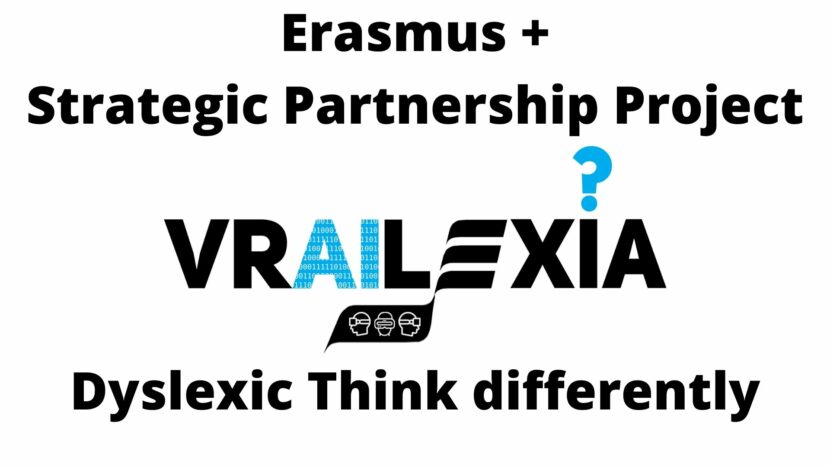After having acquired the use license of the high legibility font EasyReading® Dyslexia Friendly for all the University devices and for the telematic learning activities by default, the University of Tuscia has chosen our font also for the European project VRAILEXIA started in September 2020. Facilitating the academic path of University students with DSA by offering them a new kind of teaching, unconventional and closer to their needs, is the aim of the project.
“We are absolutely delighted to continue this partnership with the use of our font in all the tools designed and created ad hoc in the project” Federico Alfonsetti, designer of the font and CEO of the company, said. “It was the first University in Italy which believed in the importance to use a high legibility font and, still, it is now proving to be a visionary, paving the way to similar realities which are moving in the same direction”.
“The University of Tuscia is a young Athenaeum tailored to students”, this is how Scientific Head of Vrailexia project Giuseppe Calabrò introuduces the University of Tuscia, and adds “our Chancellor aims to turn the University of Tuscia into a focal point for the achievement of Sustainable Development Objectives, where every student finds the condition to best express his own capabilities. With this in mind we have chosen to use the high legibility font EasyReading® and to undertake initiative such as VRAILEXIA, where, in an innovative way, we want to break the rules and be promoters of a network of Sustainable Campus”.
What VRAIlexia is?
”VRAIlexia (Partnering Outside the Box: Digital and Artificial Intelligence Integrated Tools to Support Higher Education Students with Dyslexia) was the first project” – with a rating of 98 out of 100 – “to be funded by the European Commission within the Erasmus+ Strategic Partnership for Higher Education programme in Europe,” project manager Marcella Barone said. The word is an acronym summarizing all the aspects of the project: VR indicates virtual reality, AI artificial intelligence, while Lexia refers to tools based on cloud and on artificial intelligence able to interact with humans.
The idea
“The idea came from Giuseppe Calabrò, Professor of Engineering at the University of Tuscia, who had already presented a nationwide research and training project to the Tua2 Ministry. The objective here is to make the University a permanent laboratory of research, experimentation and innovative teaching. In September 2019, we decided to develop the idea at European level and thanks to a participatory design, we presented the proposal in response to the Erasmus + 2020 call. “Thanks to the cross-curricular nature of the team which took part in drafting the project and to the highly innovative nature of the proposal, the project was the first in the rankings and we officially started with the activities from the first of September 2020”.
The innovativeness: artificial intelligence and computer science applied on social and psychological aspects.
With Vrailexia we mean to develop a range of tools and services, which will allow dyslexic students to be in the same condition as their colleagues. The tools will be based on the application of artificial intelligence and virtual reality and they will be adjusted to the needs of the singular student supporting him in the study.
From interdisciplinarity to project outputs
The tools and services, called project outputs, will be developed within the three years of the project through an interdisciplinary work carried out by an international team involving experts in big data, engineering, psychologists, psychometrics and sociologists from 7 European Universities, 2 training centers and 1 company in the sector.
The project’s core output is the beSpecial adaptive platform, designed to help students to understand information providing synonyms, images, or other custom elements which may be more immediate for them to approach.
Next to it, by the use of virtual reality, will be developed augmented reality environments for assessment tests and immersive experiences to live for students and teachers, putting them in dyslexics’ shoes.
Finally, regarding services, we will aim to create a network of sustainable campuses that will sign a Memorandum of Understanding where inclusive strategies will be identified to put students with DSA in the same condition as their colleagues.
Last but not least, the development of two training programs, one for University teachers and the other for students, to provide skills on teaching methodologies based on the principles of Universal Design and to enhance the skills of visual thinker in a path based on an entrepreneurial approach.
The training activities will therefore lead to the creation of an internal task force in each partner University which will ensure the skills’ portability and the project results’ sustainability.
The partners
Besides the leading University, many private and public bodies have decided to support the project. There are the University of Perugia, the university consortium Tucep – Tiber Umbria Comett Education Programme and the publisher Giunti Psychometrics (Italy), the Universidad de Cordoba (Spain), the Panteion University (Greece), the Université Paris Nanterre and the Université Paris-Saclay/Centrale Supélec (France), the Universiteit UC Leuven Limburg (Belgium), the training Institution AEVA – Associação para a Educação e Valorização da Região de Aveiro (Portugal), the scientific society ICTO – Information and Communication Technologies inOrganizations and Society (France), the Italian Dyslexia Association (Italy) and the Plataforma Dyslexia (Spain).
For further information
Nadia Afragola
Press Office EasyReading Multimedia
Corso Giulio Cesare 67, 10152 Torino
nadiafragola@hotmail.com
Mobile 338.5684095
Marcella Barone – marcella.barone@unitus.it
Juri Taborri – juri.taborri@unitus.it
Università degli Studi Della Tuscia
Via S. Maria in Gradi 4, 01100 Viterbo
vrailexia@unitus.it
www.vrailexia.eu
Mobile 393.9065901

